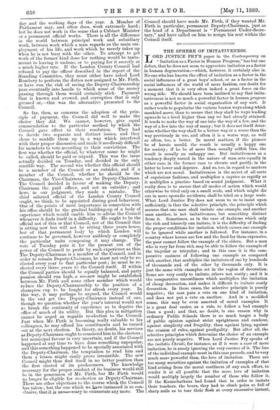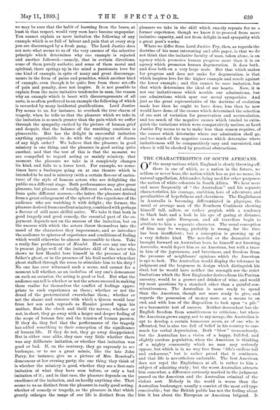THE SPHERE OF IMITATIVENESS.
TORD J17STICE FRY'S paper in the Contemporary on "Imitation as a Factor in Human Progress," has but one defect, that he does not seem to appreciate imitation as a factor in human degeneration,—which, however, it certainly also is. No one who has known the effect of imitation as a factor in the social influences of a great boys' school, or as a factor in the social influences of the world of mere fashion, can doubt for a moment that it is very often indeed a great force on the wrong side. We should have been inclined to say that imita- tativeness is not so much a powerful factor in human progress as a powerful factor in social organisation of any sort. It rather tends to popularise the various beaten ways along which mankind move, than to secure that they shall be ways leading upwards to a level higher than any we had already attained. It tends to make the way of one into the way of a few, and the way of a few into the way of many; but it does not itself deter- mine whether the way shall be a better way or a worse than the way previously in use, and often it is a worse way, as well as often, too, a better. In moral matters, if the pioneer be of heroic mould, the result is usually a happy one for society; if he be of more than usually selfish bias, the result is usually an unhappy one. But imitativeness as a tendency deeply rooted in the nature of man acts equally in either case, in the former case to elevate and purify, in the latter to lower and deprave. And so, too, in regard to matters which are not moral. Imitativeness is the secret of all sorts of capricious fashions, and multiplies a caprice as rapidly as it multiplies a practice based on sound judgment. What it really does is to secure that. all modes of action which would otherwise be tried only on a small scale, and which might die out in mere sporadic accidents, shall be tried on a large scale. What Lord Justice Fry does not seem to us to insist upon sufficiently, is that the selective principle, the principle which secures that one man shall imitate one example, and another man another, is not imitativeness, but something distinct from it. Sometimes, as in the case of fashions which only the rich and leisurely can imitate, it is the difficulty of finding the proper conditions for imitation which causes one example to be ignored while another is followed. For instance, in a country where horses are few and the food for them expensive, the poor cannot follow the example of the riders. But a man who is very far from rich may be able to follow the example of the bicyclist or tricyclist; and in this case it is the com- parative easiness of following one example as compared with another, that multiplies the imitators of one by hundreds of thousands and of the other by thousands only. It is just the same with examples set in the region of decoration. Some are very costly to imitate, others not costly; and it is the comparative uncostliness which multiplies the imitation of cheap decoration, said makes it difficult to imitate costly decoration. In these cases, the selective principle is purely negative ; the cost puts a veto on one kind of imitation, and does not put a veto on another. And in a modified sense, this may be even asserted of moral examples. It is a great deal easier, as a rule, to follow a bad example than a good; and that, no doubt, is one reason why in ordinary Public Schools there is so much larger a body of public opinion against strict uprightness and candour, against simplicity and frugality, than against lying, against the evasion of rules, against prodigality. But after all, the selective principles which determine the choice of an example are not purely negative. When Lord Justice Fry speaks of the imitatio Christi, for instance, as if it were a case of mere imitation, he is surely ignoring the very essence of it. The love of the individual example must in this case precede, and be very much more powerful than, the love of imitation. There are too many securities against the imitation of examples of that kind arising from the moral costliness of any such effort, to render it at all possible that the mere love of imitation would multiply largely the number of those who follow it. If the Kamschatkans had found that in order to imitate their teachers, the bears, they had. to climb poles so full of sharp nails as to tear their flesh at every successive instant, we may be sure that the habit of learning from the bears, at least in that respect, would very soon have become unpopular. You cannot explain as mere imitation the following of any example which is so full of labour and pain that at every step you are discouraged by a fresh pang. The Lord Justice does not note what seems to us of the very essence of the selective principle which determines why one example is rejected and another followed,—namely, that in certain directions, some of them purely a3sthetic, and some of them moral and spiritual, there springs up in the mind a passionate love for one kind of example, in spite of many and great discourage- meats in the form of pains and penalties, which another kind of example, even though it be quite free from these set-offs of pain and penalty, does not inspire. It is not possible to explain from the mere imitative tendencies in man, the reason why an example which is beset with discouragements of all sorts, is so often preferred to an example the following of which is rewarded by many incidental gratifications. Lord Justice Fry seems to us, for instance, to overlook the true charm of tragedy, when he tells us that the pleasure which we take in the imitation is so much greater than the pain which we suffer through the sympathy excited by the picture of human grief and despair, that the balance of the resulting emotions is pleasurable. But has the delight in successful imitation anything appreciable to do with the enjoyment of drama of any high order? We believe that the pleasure in good mimicry is one thing, and the pleasure in good acting quite another, and that the test of this is that the moment we are compelled to regard acting as mainly mimicry, that moment the pleasure we take in it completely changes its kind, and falls to a lower level. For example, we some- times have a burlesque going on at one theatre which is intended to be and is mimicry (with a certain flavour of carica- ture) of the style of famous actors who are delighting the public on a different stage. Both performances may give great pleasure, but pleasure of totally different orders, and arising from quite different sources,—the latter, the pleasure derived from a great enlargement of the sphere of the experience of the audience who are watching it with delight ; the former, the pleasure derived from excellent mimicry, combined with perhaps a flavour of still more skilful satire. We take it that both in good tragedy and good comedy, the essential part of the en- joyment depends not on the success of the imitation, but on the success with which the actors throw themselves into the mood of the characters they impersonate, and so introduce the audience to spheres of experience and conditions of feeling which would otherwise be almost inaccessible to them. Take a really fine performance of Hamlet. How can any one who is present judge well of the imitative skill of the actor who shows us how Hamlet bore himself in the presence of his father's ghost, or in the presence of his frail mother when that ghost stalked through the room to stimulate him to his duty? No one has ever witnessed such a scene, and cannot for a moment tell whether, as an imitation of any one's demeanour on such an occasion, the acting is good or bad. But what the audience can tell is whether or not the actors succeed in making them realise for themselves the conflict of feelings appro- priate to such experiences as these ; whether or not the dread of the preternatural overwhelms them ; whether or not the shame and remorse with which a Queen would hear from her son such reproofs as Hamlet poured upon his mother, flush the cheek and thrill the nerves ; whether or not, in short, they go away with a larger and deeper feeling of the scope of human fate and the tension of human passion. If they do, they feel that the performance of the tragedy has added something to their conception of the significance of human life. If they do not, they go away disappointed. But in either case alike, they care very little whether there was any deliberate imitation, or whether that imitation was good or bad. If, on the contrary, they go expressly to see burlesque, or to see a great mimic, like the late John Parry, for instance, give us a picture of Mrs. Roseleaf's demeanour at her evening party, the one thing they think of is whether the mimicry is good, whether they see a first-rate imitation of what they have seen before, or only a bad imitation of it ; and in that case, the pleasure depends on the excellence of the imitation, and on hardly anything else. That seems to us as distinct from the pleasure in really good acting, whether of comedy or tragedy, as the pleasure in that which greatly enlarges the range of our life is distinct from the pleasure we take in the skill which exactly repeats for us a former experience, though we know it to proceed from mere • imitative capacity, and not from delight in and sympathy with a great poet's works.
Where we differ from Lord Justice Fry, then, as regards the doctrine of his most interesting and able paper, is that we do not think that the imitative faculty of man, taken alone, is an agency which promotes human progress more than it is an agency which promotes human degeneration. It does both, and does both on a very large scale. But that which makes for progress and does not make for degeneration, is that which inspires love for the higher example and revolt against the lower example ; and this cannot be mere imitation, but that which determines the ideal of our hearts. Now, it is not our imitativeness which moulds our admirations, but our admirations which spur our moral sympathies. And just as the great representative of the doctrine of evolution made less than he ought to have done, less than he now would have done, of the causes which determined the selection of one sort of variation for preservation and accumulation, and too much of the negative causes which tended to extin- guish the variations which were comparatively useless, so Lord. Justice Fry seems to us to make less than reason requires, of the causes which determine where our admiration shall go, and too much of the negative causes which determine where imitativeness will be comparatively easy and unresisted, and where it will be checked by practical obstructions.







































 Previous page
Previous page